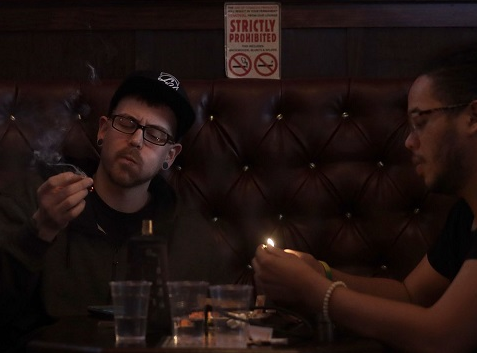Cannabis Cafes Thrive in San Francisco
In the smoking lounge of Barbary Coast Dispensary, thick clouds of cannabis smoke hang in the air as patrons—surrounded by décor reminiscent of a modern tavern mixed with a sports bar—chat and take puffs from electronic vaporizers. “You won’t find anything like this back in Jersey!” says Rick Thompson, a visitor from Atlantic City who came to San Francisco to see family, grinning as he takes in the scene.
In fact, venues like Barbary Coast Dispensary don’t exist anywhere else in America outside San Francisco. Most regional cannabis reform laws strictly limit the opening of public spaces for cannabis consumption. Currently, only California allows cannabis cafes and smoking lounges at the local level, and even here, most counties and cities are still figuring out how to open basic cannabis shops.
San Francisco is the first city in the state to license stores with dedicated spaces for cannabis consumption, essentially emulating the coffee shop system that’s been operating in the Netherlands for over 40 years. Nicole Elliott, head of the city’s Office of Cannabis, personally approved the opening of such venues after her team confirmed that designated consumption areas would reduce public exposure to potentially harmful secondhand smoke. City laws require these establishments to install ventilation and climate control systems to effectively remove smoke and vapor.
Other California Cities Consider Cannabis Lounges
Other cities in California are also considering similar spaces for cannabis consumers. West Hollywood has already approved eight licenses for cannabis cafes and clubs. Alameda, near San Francisco, recently announced plans to open two cannabis lounges, while Oakland and Tahoe each plan to open one in the coming months. Sacramento and Los Angeles are also discussing the idea, though city officials have not made any concrete promises.
Jackie Rocco, head of planning and commercial development in Los Angeles, told reporters that many residents have long complained about the lack of legal spaces to consume cannabis outside their homes. According to Rocco, city officials are discussing licensing cannabis clubs that would resemble coffee shops, but there’s no guarantee the plan will be formally adopted.
Slow Progress in Other Legal States
Elsewhere in the U.S., officials in states with full cannabis legalization are moving more cautiously. Massachusetts’ legalization law, passed two years ago, allows for “cannabis cafes” where public consumption—including smoking—would be permitted. However, the administration of conservative Republican Governor Charlie Baker, with support from the state legislature and law enforcement, has delayed even the opening of basic cannabis stores. The state’s Cannabis Control Commission unanimously decided to postpone reviewing applications for cannabis cafes until next year, while the first stores are expected to open by mid-summer. Still, many commission members remain open to the idea of public consumption spaces once the market’s organizational issues are resolved.
“Whether politicians like it or not, with legal cannabis, Massachusetts residents will consume it in public and social settings because there’s no legal alternative for gathering and consumption,” says Jim Borghesani, head of the regional Marijuana Policy Project. “We believe we should have the right to establish venues similar to bars and pubs for responsible recreational cannabis use.”
In Colorado, the first state to fully legalize cannabis, the government rejected a bill to allow tasting rooms at cannabis shops a few years ago. However, cities like Denver have taken the initiative, passing a municipal law last year to legalize cannabis consumption areas. Several public venues in Denver now welcome guests who bring their own cannabis to consume on-site.
Nevada will address the issue of cannabis clubs next year, while Oregon and Alaska have abandoned such plans altogether.
San Francisco’s Unique Approach
San Francisco authorities have long taken a neutral stance on cannabis smoking in medical dispensaries, which existed in the city well before California legalized medical cannabis in 1996. The Barbary Coast, which received its license for a cannabis smoking lounge at the start of the year, originally opened in 2013 as a standard medical cannabis shop. By the end of last year, the venue expanded to include a spacious, well-equipped lounge for cannabis consumption. On January 11, the lounge began welcoming customers without medical cannabis cards. The state’s cannabis bureau started accepting applications for cannabis clubs and cafes at the beginning of the year and has already begun certifying dozens of venues.
Rick Thompson came to California to celebrate his 27th birthday with his cousin from Oakland. After discussing party plans, they decided to go all out and throw a cannabis party at a real cannabis club. While laws prohibit the sale of cannabis products directly in the smoking lounge, Thompson’s friends stocked up on high-quality flower and THC wax concentrate at the Barbary Coast’s retail shop, which is technically a separate space from the lounge. After spending over $40 on products, the staff provided the group with bongs, rolling machines, dab rigs, and other tools for comfortable consumption.
As with other tables in the lounge, thick smoke soon rose above Thompson’s group as they debated the pros and cons of different consumption methods, taking turns with various smoking devices. Some praised the rich aroma and complex effects of quality flower, while others passionately defended the intense, fast-acting impact of concentrated cannabis extracts.
Positive Impact on the Neighborhood
The Barbary Coast shop and lounge have had a positive effect on their neighborhood. Since Barbary and a few other cannabis shops opened nearby, property values and customer traffic have increased. Unlike similar shops in Colorado, Barbary Coast proudly advertises its presence with signs and LCD screens shining from the lounge windows.
Owner Jesse Henry hopes to open a larger club about a mile from the current location, aiming for a spot near a major concert venue once city officials grant formal approval. “The whole city thrives on tourist dollars,” he says. “I believe cannabis cafes and shops will soon become a new landmark attraction in San Francisco.”



